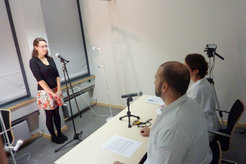Former Research Group Social Stress and Family Health
The World Health Organization has declared stress one of the major health risks of the 21st century. They predict that every second sick call in the year 2020 will be due to stress. Yet the ancient stressors to which our bodies are designed to respond, such as threats to physical integrity and physical hardship, are less prevalent than ever before. Rather, it is our tendency to mount a stress response for psychosocial reasons that has led to chronic stress exposure and stress-related disease in modern society. Stress reactivity in the social context and how social factors may be used to decrease stress reactivity, are important topics of our Research Group. A second focus of the group lies within the social neuroscience of human attachment where we assess the psychological, biological and brain bases of interpersonal relationships within families.
(1) Empathic stress

A physiological stress response is not solely experienced by the individual directly affected by the stressor. Rather, the mere observation of a stressed person is sufficient to trigger proportional release of the stress hormone cortisol in the observer. While people are most affected by the stress of their loved ones, it is even possible to “catch” the stress of a stranger. We are currently studying the mechanisms of such stress contagion between mothers and their children, and trying to determine whether empathic stress affects children’s cognitive ability and health.
Publications
(2) Effects of mental training on a wide range of stress and health markers
Another series of studies, within the framework of the 9-month longitudinal ReSource Project, focusses on the differential influence of various mental training techniques. Specifically, we examine the effects of training attention, socio-affective and socio-cognitive skills on subjective experience (arousal, mood, thoughts), brain structure, vegetative and hormonal stress parameters, as well as immune and resilience markers (brain derived neurotrophic factor, telomere length).
Publications
(3) Social neurocience of human attachment
For the examination of human attachment we recruit children, adolescents and parents, both individually and in a dyadic setting. Data are collected using advanced methods of social neuroscience, including functional magnetic resonance imaging, electroencephalography, functional near-infrared spectroscopy hyperscanning, as well as genetics and epigenetics. These data are combined with established self-report questionnaires, video ratings and semi-structured narrative interviews derived from attachment theory.
Publikationen
